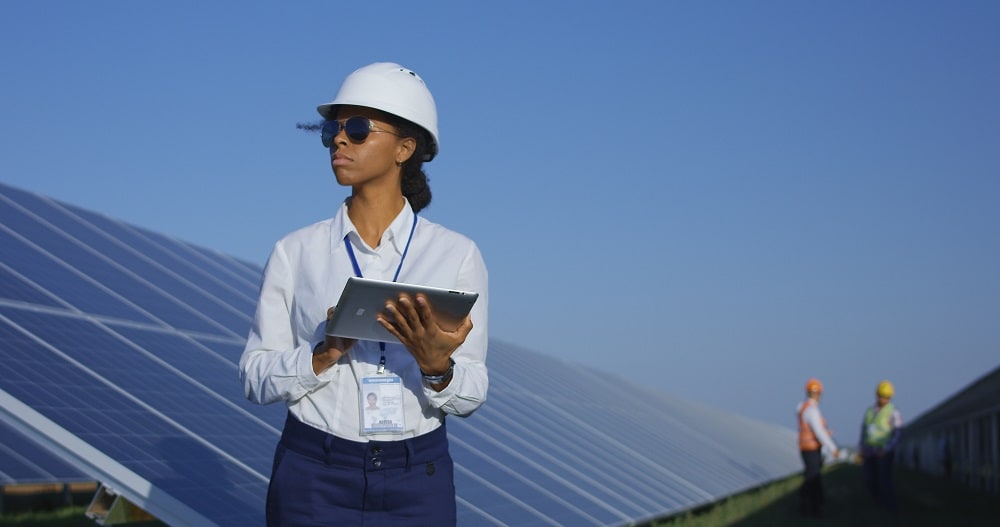What Jobs Will the Inflation Reduction Act Create?

Longer droughts, stronger heatwaves, more destructive storms—these are just some of the devastating impacts climate change is already having on our environmental, economic and social systems.
To address the crisis, the US Senate recently passed a landmark climate bill (Inflation Reduction Act) that will boost the green energy industry and remake parts of the US economy. An analysis commissioned by the BlueGreen Alliance found that clean energy investments resulting from the bill will create more than 9 million new jobs over the next decade.
What jobs will the new climate bill create?
Research shows that the new climate bill will create five million new green jobs from investments in clean energy, 900,000 in clean manufacturing, 900,000 in efficient buildings, 600,000 in natural infrastructure, 400,000 in clean transportation and 150,000 in environmental justice.
Based on each of these job growth categories, we’ve outlined several green jobs that are likely to see higher demand by 2030.
Clean Energy

More solar and wind energy engineers will be needed to support the increase in clean energy demand. Solar engineers work on solar panels, solar-powered devices, telecommunications and heating/air conditioning systems, whereas wind energy engineers work to develop aviation, mechanics or wind turbines and collector structures for wind farms.
A bachelor’s degree or higher is required for these roles, usually in majors such as energy engineering, manufacturing engineering, chemistry or civil engineering. While these can be demanding subjects of study, the compensation is typically worth it—with an average annual salary for solar and wind engineers at around $95,000.
Manufacturing and Construction

Manufacturing positions like operating technicians, warehouse operators, line supervisors and machine operators will be needed to process new manufacturing for green technology like solar panels, wind turbines and electric vehicles, plus the parts, labels and packaging involved. Construction workers will also be needed to install these new clean energy buildings, grids and infrastructure.
While many manufacturing and construction jobs do not require a college degree, some training and certifications may be necessary to obtain certain roles. However, there are frequently entry-level positions with good benefits and union membership for those who want to start from the ground up.
Natural Infrastructure

Sustainability landscape designers, infrastructure engineers, green architects and other green workers will be needed to design, construct and administer new landscape, building and infrastructure designs compatible with the natural environment. Careers in this industry focus on creating sustainable systems that can withstand stronger storms, flooding, heat and other impacts from changing climate.
Bachelor’s degrees are required for many of these roles, and some organizations also prefer applicants to have certifications in Leadership in Energy and Environmental Design (LEEDS) or accreditation from the National Green Infrastructure Certification Program (NGICP). Targeted skills such as proficiency with GIS, AutoCAD, knowledge of 3-D modeling programs as well as construction documentation and detailing are also a plus.
Clean Transportation

Transportation management will be key to redesigning new modes of transportation that have less harmful impacts on the environment and lower carbon emissions. Transport planners, transportation managers and transport engineers will all be needed to handle the logistics, design, management and cooperation of transportation upgrades. Not only do these roles actively work toward sustainability in the transport industry, but they also help to reduce transport costs through planning optimization
Good technical and problem-solving skills are needed for these roles, as well as the ability to communicate and collaborate on large-scale projects involving many moving people and parts. Transportation managers and planners tend to gain an education in supply chain management, logistics or other related fields. A passion for sustainability and pro-activity is a plus.
Environmental Justice

Environmental justice is a complex field that requires a specialized understanding of environmental issues, laws, regulations, institutions and organizations. Environmental lawyers, paralegals, compliance officers, policy administrators and other roles will need to be filled to ensure compliance with changing environmental laws, especially in the areas of water, gas, oil and energy.
While many of these careers require law degrees, there are roles for individuals interested in entry-level positions, such as organizing, activism, advocating and more. If you’re passionate about enforcing environmental policies or enacting new legislation that benefits future generations, then environmental justice might be a good career fit for you.
Interested in entering or transitioning to the green economy? At Pearson Accelerated Pathways, we can help! Reach out to one of our world-class academic advisors to get started on the right career path today.
